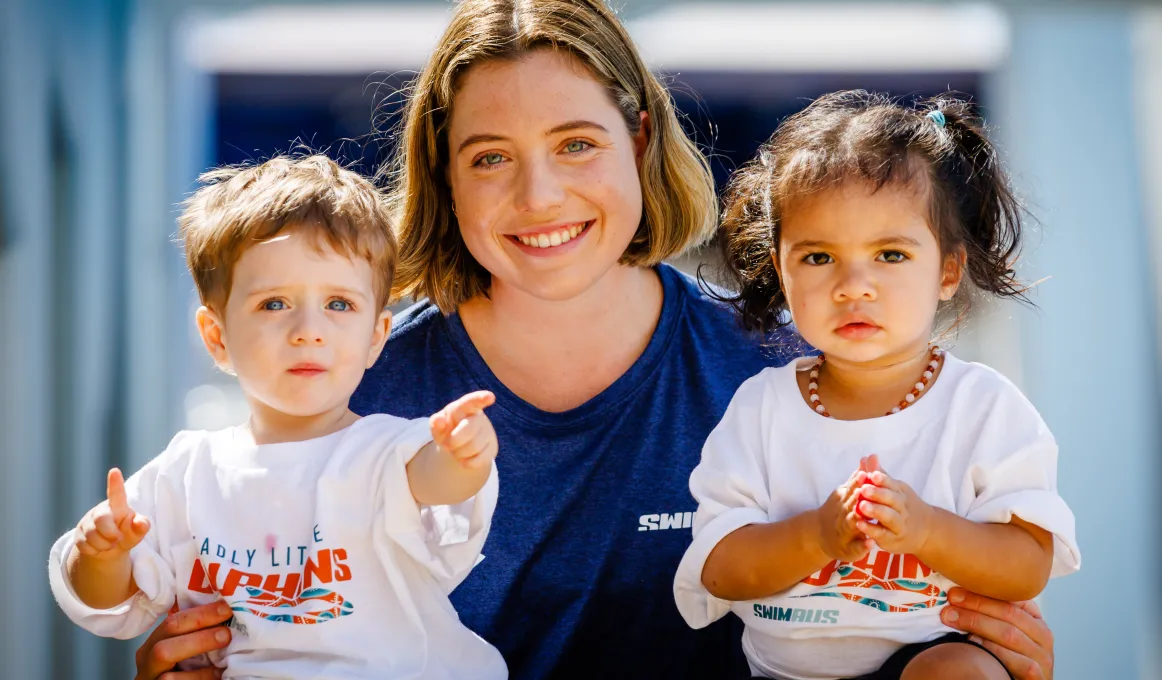Deadly Little Dolphins to improve First Nations water safety

Deadly Little Dolphins is Swimming Australia’s national call to action to ensure that Aboriginal and Torres Strait Islander children have access to learn to swim to improve their swimming and water safety skills.
Deadly Little Dolphins is a key project of the overarching Swimming Australia Deadly Dolphins initiative which aims to strengthen the swimming pathway for young Aboriginal and Torres Strait Islander athletes, harnessing developing talent across the swimming system, and ultimately, deliver an Olympic and/or Paralympic medal by an Aboriginal and Torres Strait Islander swimmer at Brisbane 2032.
The first Deadly Little Dolphins learn to swim pilot program is being developed with the Thursday Island community, local schools and community members included. A suite of co-designed in- school learn to swim programs, beginner squad programs and LTS teacher and Coach education programs will be delivered as part of the Thursday Island Deadly Little Dolphins initiative.
Danny Morseu, Olympian, Deputy Chairperson of the Australian Olympic Committee (AOC) Indigenous Committee, and Thursday Island resident, says: 'Swimming Australia’s Deadly Little Dolphins program is a wonderful initiative and we on Thursday Island are excited by the programs potential.'
'Our community is water loving and a structured sustainable in-school learn to swim program for our children, along with opportunities to develop swimming stroke competency amongst our local children and youth is exciting and is very welcome.'
'We would love a Thursday Island community member to be on the Australian Olympic/Paralympic Team in Brisbane '32.'
Swimming Australia CEO Eugenie Buckley explained the co-designed Deadly Little Dolphins’ Learn to Swim programs aim to improve the swimming and water safety skills for all First Nations communities.
'First Nations people are disproportionately represented in drowning statistics, and that is not good enough,' Buckley said.
'Swimming Australia is committed to help reduce drownings in Aboriginal and Torres Strait Islander communities, and to reduce mortality rates from drownings for First Nations children.'
The Australian Water Safety Council (AWSC), which Swimming Australia is a member of alongside Royal Life Saving Australia, Surf Life Saving Australia and a number of key industry voices, identifies in its Australian Water Safety Strategy 2030 that Aboriginal and Torres Strait Islander peoples are a key community of focus with First Nations Australians representing three per cent of the Australian population, but accounting for five per cent of all drownings.
Aboriginal and Torres Strait Islander children are also more likely to experience a non-fatal drowning, which can leave them with a long-term brain injury or other organ damage, following oxygen deprivation.
Shockingly, in Queensland, for every fatal Aboriginal and Torres Strait Islander drowning, there are 9 non-fatal drownings.
Swimming Australia has and will continue to undertake consultation with Aboriginal and Torres Strait Islander communities, agencies, learn to swim and education delivery partners and experts to ensure Deadly Little Dolphins learn to swim programs are designed for community by community.
Swimming Australia will partner with schools, swim schools, swimming pool operators, councils, and community groups to deliver Deadly Little Dolphins across Australia.
In addition to Thursday Island, planning is well progressed with delivery partners in South-East Queensland and regional New South Wales, in order for the first Deadly Little Dolphins programs to be ready in a range of locations for the start of Term Four in schools.
'Crucial to the success of Deadly Little Dolphins is that Aboriginal and Torres Strait Islander people are identifying the best possible model of delivery for their individual communities. First Nations people have a close cultural connection to country, including waterways and it’s vital this is taken into consideration, including recognising that a pool may not always be the best location to deliver the program,' Buckley said.
Swimming Australia will address other learn to swim program barriers for First Nation communities, including cost, access, transport and culturally appropriate content and delivery.
Additionally, Aboriginal & Torres Strait Islander coaches will be supported with tailored education and additional support and mentoring to progress their careers as coaches.
Swimming Australia will be exploring partnership opportunities with Governments and corporate Australia to ensure sustainable long-term delivery of the Deadly Little Dolphins initiative across the nation.
Deadly Little Dolphins also forms part of Swimming Australia’s structured pathway to deliver the next generation’s Aboriginal and Torres Strait Islander sporting icon in Australia’s highest profile Olympic and Paralympic sport.
'Thirty-two years after Cathy’s incredible moments at Sydney 2000, together, let’s deliver that same awe-inducing moment of pride and celebration for Australia’s next generation,' Buckley said.
The ambition is backed by Quandamooka man and BNE32 Legacy Committee Panellist Cameron Costello. 'I’m really excited by the potential of this program,' said Costello.
'What I’m hoping to see is that right throughout Australia, we’re creating these beautiful little pods of First Nation People, and have these pod squads working together to drive forward to have an Olympic champion that is a First Nations person for Australia, our great Country.'
Australia’s highest profile and most successful Olympic and Paralympic swimmer is the former world swimming champion and Olympic medalist Sam Riley. Proud Wiradjuri woman Bianca Crisp was recently named in the Dolphins Team for the 2023 World Open Water Championships in Fukuoka.